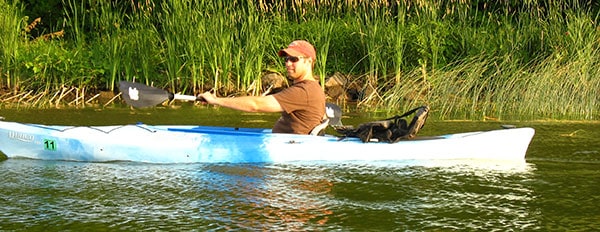People have been fishing from canoes for a very long time, but recently kayak fishing has been gaining in popularity. If you are in the market to buy either a canoe or kayak, here are the things you need to consider.
| Canoe | Kayak | |
| Price | More expensive | Less expensive |
| People | 1 to 4 people | 1 or 2 people |
| Gear | More gear | Less gear |
| Stability | Less stable | More stable |
| Maneuverability | Less maneuverable | More maneuverable |
Now that you are leaning towards one or the other based upon the graph above, lets get into the details, because there are a wide range of canoes and kayaks out there and you might find that you change your mind based upon the following information.
How Much Does a Canoe Cost?
Lets face it, money will be the biggest deciding factor when it comes to purchasing a new boat, so lets review that first.
The price of a canoe will vary greatly with quality, size and manufacturer. A good quality canoe will sell for $2000, but you can get a cheaper one for $350 brand new. If you would like a fine handcrafted wooden canoe, plan on spending around $3500, but we are talking about fishing here, so you are probably more interested in a canoe that will function well and are less interested in looks.
Here are some examples of new canoe prices:

Sun Dolphin Mackinaw 15.6′ – $499 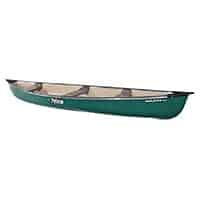
Pelican 15.5′ – $349.99 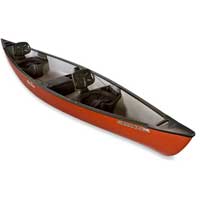
Old Town Saranac 146 – $699.95 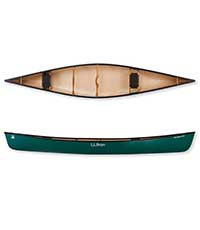
LL Bean West Branch Canoe – $1,999 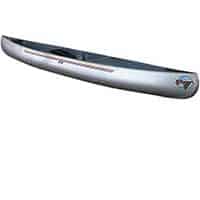
Grumman 12.9′ Solo Canoe $1,315 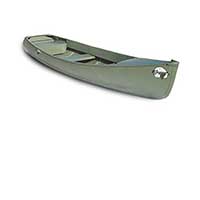
Grumman Sportboat 15′ – $3,529
How Much Does a Kayak Cost?
Overall kayaks are less expensive than canoes, but they can get pretty fancy as well. There are many types of kayaks, so I will focus on ones specifically designed for fishing.
I bought my first kayak in 2008 for $600. It is a 12 ft sit in kayak by Old Town. It’s a good quality kayak, but at that time, if I went any cheaper, there was a big difference in quality. It seems like everyone is selling kayaks these days, and the price has significantly been reduced. You can now get a decent quality kayak from Wal-Mart for $235! Now if you would like a foot propelled high end kayak, you will spend upwards of $3,000.
Here are some examples of new kayak prices:
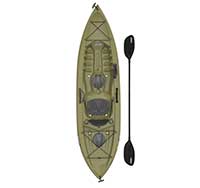
Lifetime Tamarac Angler 100 – $235 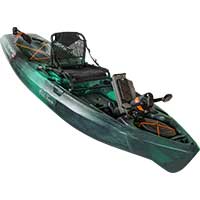
Old Town Topwater PDL – $1,999 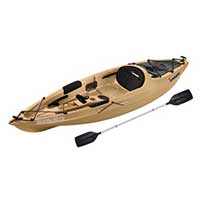
Sun Journey 10′ Angler – $240 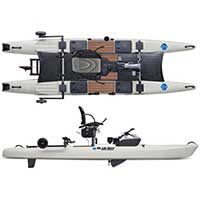
Blue Sky 360 Angler – $3,499 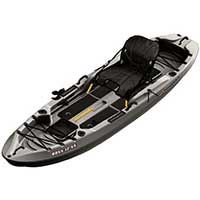
Sun Dolphin Boss 12′ Sit / Stand Angler – $599.99 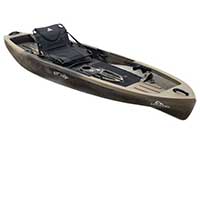
Ascend Sit on Top Camo – $549.99
How Many People Can a Canoe Hold
Canoes come in many sizes. The longer the canoe, the more people it can hold. The longest canoe is 149 feet 1 inch, according to the Guinness Book of World Records. You can’t buy that one, so lets look at some canoes that are more attainable.
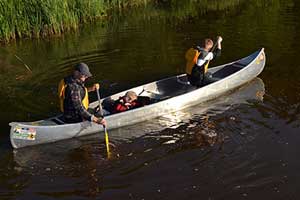
16 and 17 ft canoes are among the most popular sizes. Most canoes come with a seat in the front and back which will accommodate two people. You will able able to find ones with 3 seats though in this same size range. If you want to hold 4 people, you will likely need one at least 18 ft.
How Many People Can a Kayak Hold
Kayaks also come in many lengths, but typically only hold one person. They do make tandem kayaks, but I think that defeats the purpose of fishing out of a kayak. The fact that you have total control and can go fish wherever you want is what’s so appealing about kayak fishing.
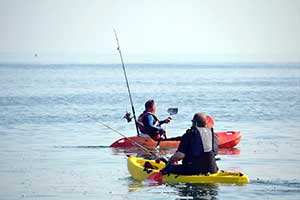
How Much Weight Can a Canoe Hold
Once again, the size of your canoe will determine how much weight or cargo you can carry with you. Canoes designed for fishing have flat bottoms with wide beams which make them more stable and can haul more weight. The material the canoe is made of will also affect its weight limit.
Average cargo weights of popular canoes
| 13 foot | 750 Lbs |
| 14 foot | 700 – 825 lbs |
| 16 foot | 800 – 950 lbs |
| 17 foot | 740 – 1200 lbs |
| 18 foot | 1,400 lbs |
How Much Weight Can a Kayak Hold
Most fishing kayaks are 10-13 feet long. Longer kayaks track straighter and are easier to paddle, but for fishing, you want maneuverability, which means you want a shorter kayak, but still long enough to hold your fishing gear. Even at 13 feet, a kayak can’t hold as much as a canoe.
Here are average cargo weights for popular kayaks
| 10 foot | 275 lbs |
| 12 foot | 375 lbs |
| 13 foot | 400 lbs |
Note: I did find a 12.5 foot fishing kayak that holds 525 lbs, so look around at different manufacturers to find your best fit.
Is a Canoe or Kayak More Stable
Neither one is as stable as an actual fishing boat, but if you’re careful, you can give up some stability for the benefits these boats offer.
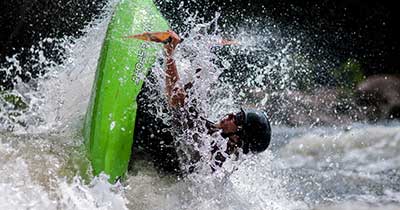
Kayaks are generally more stable than canoes because they sit lower in the water. The fisherman sits on the bottom of the kayak providing a lower center of gravity. Canoes have seats which allow you to sit up higher with your legs underneath you, but this extra comfort makes the canoe less stable.
How to Maneuver a Canoe
As I mentioned before, canoes usually have a seat in the front and back ends. If you are by yourself, you will paddle from the back. If you have a friend along, they can also help paddle from the front.
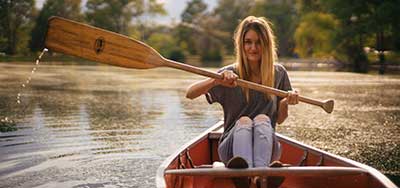
The fact that you can only paddle from one side at a time, and are at the far end the canoe, makes maneuvering more difficult than a kayak. If you are paddling with a friend, then you must coordinate with each other to make sure you are both going to the same place. If you want to have some fun, just watch two inexperienced people try to paddle a canoe. It will provide hours of entertainment.
How to Maneuver a Kayak
Kayaks are very maneuverable and easy to paddle. Kayaks use a paddle that can be used on both ends so you can easily alternate left and right strokes.
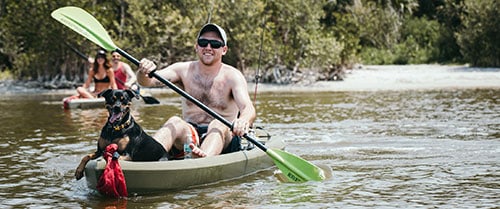
You also sit near the center of the kayak so the boat pivots in the middle, which allows you to make full turns in tight spaces. It’s also easy to go forwards and backwards with small movements of the paddle.
Personal Experience Fishing From a Canoe and Kayak

I’ve fished out of both a canoe and a kayak. They both have pros and cons, but if you want to spend a lot of time fishing, I would recommend the canoe. I absolutely love kayaking, but when I tried fishing from it, I found one issue that makes the decision easy for me. When I fish, I like to be up high looking down at the water. I found it difficult to cast a pole sitting so low to the water. It was also difficult to access my supplies, which were strapped down behind me. A canoe gives you the lightweight boat, that’s easy to carry, but also gives you ample storage and some leg room to stretch out and occasionally stand up. I will still occasionally fish from my kayak, but I will mostly save it for just relaxing on the lake.
